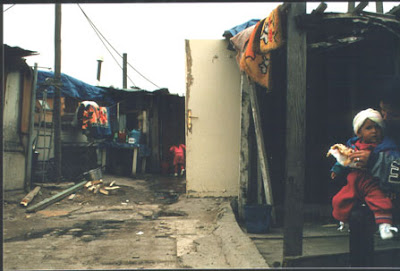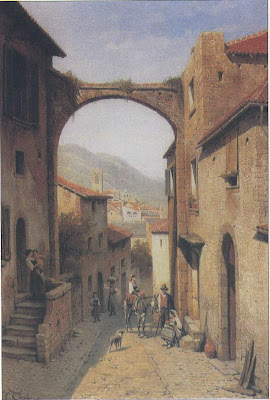Clouds in the blue Italian sky...
LA (s)fortuna di leggere giornali stranieri mi porta, di quando in quando, a delle inattese scoperte, che danno una bella scossa alla percezione dell'attuale immagine italiana all'estero.
Ecco un estratto dall'articolo dell' International Herald Tribune dove si racconta il Belpaese che non si vede....

Thousands lead invisible life in Italy
Sunday, September 14, 2008
Sunday, September 14, 2008
ROME: They speak Italian, eat Italian and cheer for Italy's football stars, but they are not Italian. In fact, it's hard to say what they are.
Thousands of people are living in Italy without citizenship or identity documents from any country. Most were citizens of countries that no longer exist, like Yugoslavia or the Soviet Union. But they never received citizenship from the new countries that replaced their broken-up nations, and they also fail to meet the requirements to become citizens of Italy.
It's hard to know how many there are because they survive on the margins of society, but the Sant'Egidio Community, a Rome-based Catholic organization, puts the number at about 10,000 to 15,000. They are often hunted by authorities, who try to deport them as illegal immigrants even though they have nowhere to go.
Life in limbo can be particularly harsh for those who were born and went to school in Italy. Once they turn 18, they become little more than illegal immigrants under the law.
"We are not Yugoslav, we are not Italian. We are like clouds," said Toma Halilovic, who lives with his parents, wife and children in two containers in a makeshift camp on the outskirts of Rome.
Halilovic, 26, was born in the Italian capital to Yugoslav parents who came here legally in the 1970s. He went through compulsory basic schooling, made friends with local children and picked up a passion for the capital's AS Roma football team.
When he turned 18, he thought he would receive citizenship. Children born to foreigners in Italy do not automatically receive citizenship, but they can claim it between ages 18 and 19 if they have lived in the country continuously and legally.
When he turned 18, he thought he would receive citizenship. Children born to foreigners in Italy do not automatically receive citizenship, but they can claim it between ages 18 and 19 if they have lived in the country continuously and legally.
Halilovic said his application was turned down on a technicality: He was not registered as a resident at birth because at the time it was not required by law.
"They told me I was born in transit," he said. "What does that mean? This is my country."
In some cases, parents do not register children at birth because they have lost citizenship of their own countries of origin and cannot renew their Italian residency permits, said Paolo Morozzo della Rocca, a professor of immigration law at the University of Urbino, in central Italy.
"They told me I was born in transit," he said. "What does that mean? This is my country."
In some cases, parents do not register children at birth because they have lost citizenship of their own countries of origin and cannot renew their Italian residency permits, said Paolo Morozzo della Rocca, a professor of immigration law at the University of Urbino, in central Italy.
(...) Many of the nearly invisible people in Italy are Gypsies from the former Yugoslavia. Their lack of identity papers and a work permit gives them little opportunity to study, get a job and leave the poor encampments that house much of Italy's Gypsy population of 150,000.
The Gypsies are the target of a much-criticized census by Premier Silvio Berlusconi's conservative administration, which includes fingerprinting adults and children if they don't have a valid ID.
The government says the measure is needed to establish who is in the country illegally, to curb street crime and to get Gypsy children to attend school.
In August the government also began deploying thousands of soldiers to help police fight crime, patrol city streets and check documents.
"I'm afraid each time I leave home," Halilovic told The Associated Press in an interview. "Even more now with all these soldiers around. If they catch you they lock you up like a thief."
"I'm afraid each time I leave home," Halilovic told The Associated Press in an interview. "Even more now with all these soldiers around. If they catch you they lock you up like a thief."
But there's a catch-22 situation in Italy:
The Interior Ministry requires a residency permit to recognize people as stateless. And a residency permit cannot be obtained without a valid passport, which stateless people do not have.
The only alternative is to sue the ministry in a civil court, which can take at least three years, Morozzo della Rocca said. He noted that most people without documents lack the time and money to go to court.
"Italy is being dishonest in applying the convention," he said.
"Italy is being dishonest in applying the convention," he said.
Halilovic began the court process six years ago, and carries around court papers as his sole document. But police still arrested him as an illegal immigrant two years ago during a routine check.
He said he was sent to a temporary holding center in Turin, but was quickly released thanks to his contacts with Sant'Egidio and its lawyers.
He said he was sent to a temporary holding center in Turin, but was quickly released thanks to his contacts with Sant'Egidio and its lawyers.
(...) Halilovic is unemployed and collects scrap metal for resale, the most common occupation for Gypsies in Italy. His four children, ranging from 5 months to 4 years in age, cannot be registered as residents because of their father's status.
They could face the same problems when they turn 18.
"If they had given me citizenship I could have made something of myself, I could have continued to study or joined the army," he said. "We need a document, any document. We need it so we can give our children a future."

Commenti
Sarebbe altrettanto interessante indagare che cavolo significa essere - anzi sentirsi - italiani. Portatori di una nazionalità, per caso, visto che non si decide dove nascere, molti invece si abbarbicano su assurde posizioni razziste. Il problema è che molte son zucche vuote che manco l'italiano conoscono, figuriamoci altre lingue per leggere questi articoli.
Ma non molliamo!
Articolo davvero interessante!
una buona settimana
Adesso che da lontano vedo come qui trattano gli immigrati ( io sono una di loro) e come invece noi non abbiamo idea di cosa fare e di come rispettare la dignità di questa gente.
Sono sempre dell'idea che ci vorrebbe una bella rivoluzione..o anche solo scendere in piazza, ma sul serio per far cambiare un pò di cose.
Giuro che prenderei il primo aereo per tornare a "marciare".
Ciao Fabio.
Daniele, il Rockdichter.
Un bacio.